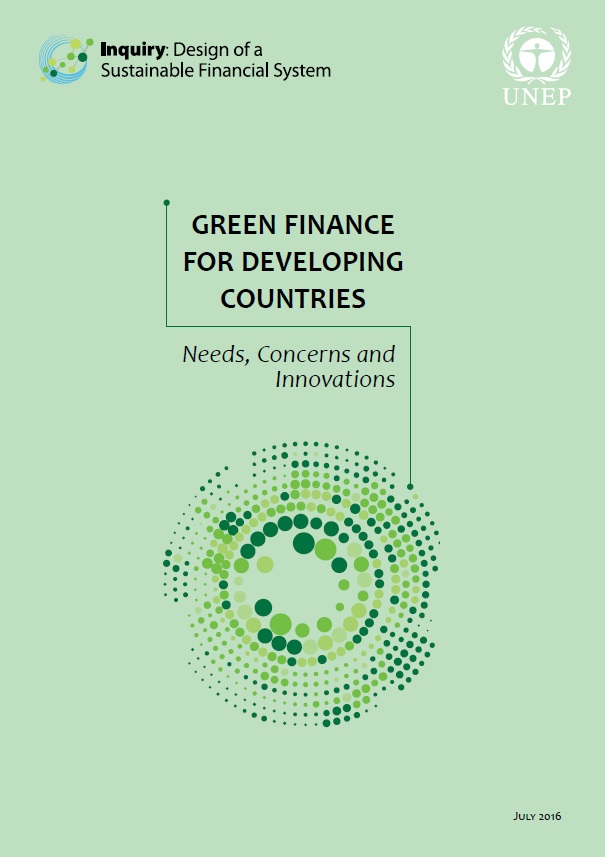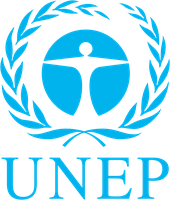Green Finance for Developing Countries
SUMMARY AND KEY FINDINGS
CONTEXT
THIS BRIEFING outlines key concerns and needs of developing countries in relation to green finance, particularly focusing on developing countries that are not members of the G20. It also highlights emerging innovations, drawing in particular from engagement with practitioners and regulators from Bangladesh, Colombia, Egypt, Honduras, Jordan, Kenya, Mauritius, Mongolia, Morocco, Nigeria, the Philippines, Thailand and Viet Nam, and the findings from the UNEP Inquiry’s country studies.
GREEN FINANCE is a strategy for financial sector and broader sustainable development that is relevant around the world. But the context differs considerably for different countries. Developing countries, notably those with underdeveloped financial systems, face particular challenges in financing national development priorities.
FINANCIAL DEVELOPMENT shapes the context for green finance. Different sources of capital and financial institutions are particularly relevant in different countries. Financial systems in developing countries tend to be characterized by a dominant banking sector, and have large areas of the economy that remain unserved by the formal financial sector. Public finance and foreign direct investment can be particularly important as sources of long-term investment.
Broadly, concern and action to align financing to sustainable development is concentrated in three areas:
- PREVENTING THE FINANCING OF ILLICIT PRACTICES OR PROFITING FROM WEAK ENFORCEMENT. Weak enforcement of environmental, economic and social policies and regulations can lead to social conflicts and market impacts resulting in losses to lenders and investors, and even macroeconomic stability risks.
- UNLOCKING OPPORTUNITIES FOR GREEN INVESTMENT. In many countries, opportunities for green finance such as renewable energy, energy efficiency, agricultural development and Small and Medium-sized Enterprises (SMEs) productivity, as well as insurance markets, are potentially commercially viable, but inadequate owing to barriers in demand or supply.
- EXPLORING SOLUTIONS TO DILEMMAS AND TRADE-OFFS. Many developing countries face a tension between the need to expand the electricity supply and reduce fossil fuel intensity. Similarly, SME finance is an area where regulators must be careful that lending requirements do not result in reduced overall lending or higher rates of non-performing loans and financial instability.
KEY FINDINGS
KEY CONCERNS OF DEVELOPING COUNTRIES:
1. INTEGRATED APPROACH – It is strongly emphasized that environmental considerations in financing be addressed in conjunction with economic and social issues and priorities, in particular access to finance for SMEs.
2. DILEMMAS, GAPS AND TRADE OFFS – International measures to promote appropriate green financing of the transition to a green economy should not come at the cost of developing countries’ competitiveness, equity, development and financial inclusion.
3. IMPACTS OF INTERNATIONAL DEVELOPMENTS – Developments in the international financial system, including those in major national financial centres, impact on developing countries positively and negatively. This makes G20 country deliberations and actions a key matter for all developing countries seeking to achieve sustainable development.
ACTION BY DEVELOPING COUNTRIES:
4. NATIONAL COLLABORATION – National strategies and road maps for aligning financial system development with the needs of sustainable development are being elaborated in a number of countries involving public and private actors, and combining market-driven approaches with policies, regulations and standards. These processes are critical to reduce reliance on pioneering individuals or institutions.
5. DISRUPTIVE POTENTIAL – New business models across the financial system, such as those enabled by mobile money and blockchain ledgers, offer the potential for ‘leapfrogging’ that can drive more inclusive, green financial market developments. These could be promoted while recognizing the need to ensure the integrity and robustness of financial markets.
SPECIFIC NEEDS OF DEVELOPING COUNTRIES:
6. INWARD DIRECT INVESTMENT– A key challenge is how to support long-term green finance effectively in advance of mature local bond markets developing. This may include blended finance approaches, drawing on public institutional investment vehicles and integrating green finance considerations into foreign direct investment, as well as pioneer issuance of green bonds.
7. FINANCIAL SYSTEM DEVELOPMENTS – Developing countries need to be able to contribute to international debate and practice, through the G20 and other relevant fora.
8. INTERNATIONAL KNOWLEDGE SHARING – Enhanced cooperation is needed to share experience between countries by leveraging, extending and connecting existing platforms and initiatives.
To download the full report,please click here.

